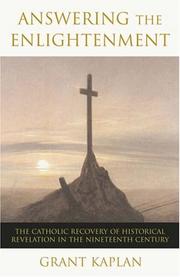| Listing 1 - 6 of 6 |
Sort by
|
Book
ISBN: 026810087X 0268100888 0268100853 0268100861 9780268100865 9780268100858 9780268100872 9780268100889 Year: 2016 Publisher: Notre Dame
Abstract | Keywords | Export | Availability | Bookmark
 Loading...
Loading...Choose an application
- Reference Manager
- EndNote
- RefWorks (Direct export to RefWorks)
Since the late 1970s, theologians have been attempting to integrate mimetic theory into different fields of theology, yet a distrust of mimetic theory persists in some theological camps. In Rene Girard, Unlikely Apologist: Mimetic Theory and Fundamental Theology, Grant Kaplan brings mimetic theory into conversation with theology both to elucidate the relevance of mimetic theory for the discipline of fundamental theology and to understand the work of Rene Girard within a theological framework. Rather than focus on Christology or atonement theory as the locus of interaction between Girard and theology, Kaplan centers his discussion on the apologetic quality of mimetic theory and the impact of mimetic theory on fundamental theology, the subdiscipline that grew to replace apologetics. His book explores the relation between Girard and fundamental theology in several keys. In one, it understands mimetic theory as a heuristic device that allows theological narratives and positions to become more intelligible and, by so doing, makes theology more persuasive. In another key, Kaplan shows how mimetic theory, when placed in dialogue with particular theologians, can advance theological discussion in areas where mimetic theory has seldom been invoked. On this level the book performs a dialogue with theology that both revisits earlier theological efforts and also demonstrates how mimetic theory brings valuable dimensions to questions of fundamental theology
Girard, Rene, --- 2 GIRARD, RENE --- 291.1 --- 291.1 Godsdienstfilosofie --- Godsdienstfilosofie --- 2 GIRARD, RENE Godsdienst. Theologie--GIRARD, RENE --- Godsdienst. Theologie--GIRARD, RENE --- Girard, René --- Desire (Philosophy) --- Desire --- Apologetics. --- Philosophical theology. --- Christianity --- Religious aspects --- Christianity. --- Philosophy. --- Girard, ReneÌ,
Book
ISBN: 9780813235837 0813235839 9780813235844 Year: 2022 Publisher: Washington The Catholic University of America Press
Abstract | Keywords | Export | Availability | Bookmark
 Loading...
Loading...Choose an application
- Reference Manager
- EndNote
- RefWorks (Direct export to RefWorks)
In this theological essay, Grant Kaplan revisits the key figures and debates that shape how faith and reason relate. Divided into three parts, Kaplan invites readers into a conversation that has helped to shape Christianity and modern civilization. Readers will encounter the words and arguments of some of Christianity's greatest thinkers, some well-known (Augustine, Aquinas, Luther, Newman) and others nearly forgotten. Readings of these fifty figures bring them to life in an accessible manner for a range of audiences: theologians and philosophers, instructors, graduate students, seminarians, lay study groups, and undergraduate theology majors. Rather than simply summarizing their thought, Kaplan traces their arguments through key texts.
Faith and reason --- Christianity --- History --- History.
Book
Year: 2004 Publisher: New Orleans Loyola university. Department of religion studies
Abstract | Keywords | Export | Availability | Bookmark
 Loading...
Loading...Choose an application
- Reference Manager
- EndNote
- RefWorks (Direct export to RefWorks)

ISBN: 0824523644 9780824523640 Year: 2006 Publisher: New York Crossroad
Abstract | Keywords | Export | Availability | Bookmark
 Loading...
Loading...Choose an application
- Reference Manager
- EndNote
- RefWorks (Direct export to RefWorks)
Enlightenment --- Religion --- Philosophy --- Catholic Church. --- Germany --- Intellectual life.
Book
ISBN: 0813218926 Year: 2009 Publisher: Washington, D.C. : Catholic University of America Press,
Abstract | Keywords | Export | Availability | Bookmark
 Loading...
Loading...Choose an application
- Reference Manager
- EndNote
- RefWorks (Direct export to RefWorks)
Tübingen School (Catholic theology) --- Catholic Church --- Doctrines --- History --- Tubingen School (Catholic theology)
Book
ISBN: 9780198845768 0198845766 Year: 2023 Publisher: Oxford Oxford University Press
Abstract | Keywords | Export | Availability | Bookmark
 Loading...
Loading...Choose an application
- Reference Manager
- EndNote
- RefWorks (Direct export to RefWorks)
"From the closing decades of the eighteenth century, German theology has been a major intellectual force within modern Western thought, closely connected to important development in idealism, romanticism, historicism, phenomenology, and hermeneutics. Despite its influential legacy, however, no recent attempts have sought to offer an overview of its history and development. The Oxford History of Modern German Theology, Volume I: 1781-1848, the first of a three-volume series, provides the most comprehensive multi-authored overview of German theology from the period 1781-1848. The study covers categories frequently omitted from earlier overviews of the time period, such as the place of Judaism in modern German society, race, and religion, and the impact of social history in shaping theological debate. Rather than focusing on individual figures alone, the volume describes the narrative arc of the period by focusing on broader intellectual and cultural movements, ongoing debates, and significant events. It furthermore provides a historical introduction to each of the chronological subsections that divides the book. Moreover, unlike previous efforts to introduce this time period and geographical region, this volume offers chapters covering such previously neglected topics as religious orders, the influence of Romantic art, secularism, religious freedom, and important but overlooked scholarly initiatives such as the Corpus Reformatorum. Attention to such matters will make this volume an invaluable repository of scholarship and knowledge and an indispensable reference resource for decades to come." --
| Listing 1 - 6 of 6 |
Sort by
|

 Search
Search Feedback
Feedback About UniCat
About UniCat  Help
Help News
News